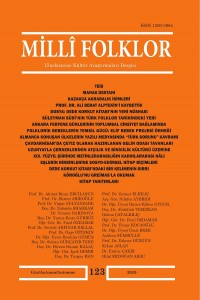Öz
Become a discipline of folklore in Turkey begins after about a hundred years from Europe. The development in Turkey covers about two hundred year period. Folklore studies, which started after the conquest of Istanbul by the Turks in Europe, began to gain maturity in the nineteenth century. The work of leading folklorists such as J. Macpherson, Herder, Grimm Brothers, E. Lönrot prepares the scientific background of folklore. William J. Thoms, in his article published in 1846 under the pen-name Amberso Merton, used the term 18 folklore, to become the father of this discipline. The movements such as the Renaissance, reforms and the French Revolution are important social phenomena in Europe in terms of folklore. As a result of these, folklore has developed around movements such as humanism and romance. The Ottoman Empire is also influenced by these processes, and the pioneering work of folklore is dealt with around the romantic nationalism after the proclamation of the Tanzimat Edict. The articles published by Ziya Gökalp, Fuad Köprülü and Rıza Tevfik are accepted as the pioneering works of folklore. In these studies, the term folklore is covered by terms such as halkiyat, halk bilgisi, hikmet-i avam, budun bilgisi. The subject of the study onset of folklore movement in Turkey when describing forgotten or are overlooked have a name also Z. Gokalp, F. Köprülü contemporary of pioneering folklorist as Süleyman Sudi and publications activities in his public science. Süleyman Sûdî was born in 1890 in Crimea-Bahçesaray. After completing his education in Crimea, he came to Istanbul, the capital of the Ottoman Empire. He continues his education at Vefa High School. He starts his business life as a shop assistant at the Cemiyet Bookshop. Then he works in many commercial fields such as paperwork and brokerage. In addition to his commercial life, Sudi has activities such political, intellectual and literary. It is actively involved in many associations, especially the Crimean Association. In 1908, he founded a publishing house named “Kitabhane-i Sûdî”. In addition to her publishing activities, he also works as the concessionaire and editor of many journals such as Haber, Crimean Journal and Musavver Children’s Mail. Sûdî’s folklore studies also focused on the more popular narratives. His first work of folklore is called “Arzu and Kanber”, described by minstrel and storyteller. Folkloric studies, especially eight folk story of the Sudi, consist of clauses, joke, folktale and periodicals. He adopted a conservative approach to identifying texts in oral culture and publishing them in a secondary culture setting. These activities of Sudi have not been studied in a wide area in the history of Turkish folklore. The main problem of this study is the determination of its place in the history of folklore and its lack. In this context, his place in the history of folklore has been questioned and determined.
Anahtar Kelimeler
Folklore Turkish folklore history Suleyman Sudi written folk story culture
Kaynakça
- Altuntek, N. Serpil. İlk Türk Matbaasının Kuruluşu ve İbrahim Müteferrika. Hacettepe Üniversitesi Edebiyat Fakültesi Dergisi, 1993 10(1): 191-204.
- Burke, Peter. Yeniçağ Başında Avrupa Halk Kültürü. İstanbul: İmge Kitabevi, 1996.
- Büyükarman, Didem Ardalı. Moralızade Vassâf Kadri ve Süleyman Sûdî’nin Ortak Romanları Millî Cinâyât Koleksiyonu. Atatürk Üniversitesi Türkiyat Araştırmaları Enstitüsü Dergisi, 2010 16(40): 191-208.
Öz
Anahtar Kelimeler
Halk bilimi Türk folklor tarihi Süleyman Sûdî yazılı halk hikâyeciliği kültür
Kaynakça
- Altuntek, N. Serpil. İlk Türk Matbaasının Kuruluşu ve İbrahim Müteferrika. Hacettepe Üniversitesi Edebiyat Fakültesi Dergisi, 1993 10(1): 191-204.
- Burke, Peter. Yeniçağ Başında Avrupa Halk Kültürü. İstanbul: İmge Kitabevi, 1996.
- Büyükarman, Didem Ardalı. Moralızade Vassâf Kadri ve Süleyman Sûdî’nin Ortak Romanları Millî Cinâyât Koleksiyonu. Atatürk Üniversitesi Türkiyat Araştırmaları Enstitüsü Dergisi, 2010 16(40): 191-208.
Ayrıntılar
| Birincil Dil | Türkçe |
|---|---|
| Bölüm | ARAŞTIRMA MAKALELERİ |
| Yazarlar | |
| Yayımlanma Tarihi | 29 Eylül 2019 |
| Yayımlandığı Sayı | Yıl 2019 Cilt: 16 Sayı: 123 |


